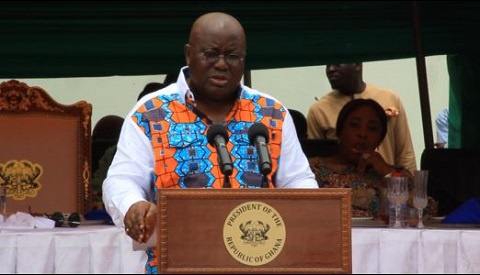
 Nana Akufo-Addo, Attorney General and Minister for Justice, on Saturday indicated the government's intention to present a bill to parliament for consideration for the establishment of National Reconciliation Commission.
Nana Akufo-Addo, Attorney General and Minister for Justice, on Saturday indicated the government's intention to present a bill to parliament for consideration for the establishment of National Reconciliation Commission.
He said the enactment would enable government to reconcile the nation in a transparent manner devoid of partisanship characteristics and provide the necessary restitution to victims.
Nana Akufo-Addo said this at the inauguration of the first National Constitution Week celebration in Accra organised by the National Commission for Civic Education (NCCE).
The celebration is a period when the entire Ghanaian community is to participate in discussions, debates, theatre performances and other activities on the Constitution to ensure that it becomes a living document embodied on the mind and heart for the attainment of democracy and good governance in Ghana.
The week was borne out of an urgent demand for knowledge and information by Ghanaians to accelerate the growth and sustenance of democracy and constitutionalism in the country.
Nana Akufo-Addo urged governmental institutions to use the week to review their programmes to conform to the new democratic dispensation and the wind of "Positive Change".
The Attorney General said measures are underway to de-confiscate improperly confiscated assets to their rightful owners, saying "the process of restoration of assets has begun."
Nana Akufo-Addo paid tribute to individuals and institutions that embarked on a national crusade for the entrenchment of constitutional democracy in the country.
Oyeeman Wereko Ampem II, Amanorkromhene, who chaired the occasion, called on the NCCE to collaborate with the Ministry of Education for the restoration of Civic Education on the school curriculum.
He noted that statisticians would not have difficulties in showing a high correlation between the decline of civics as a subject within school curricula and the emergence of pervasive culture of wanton non-compliance in the country.
Oyeeman Ampem said the culture of non-compliance is at the root of several problems that are currently plaguing the country, which have limited the national developmental prospects.
"This has manifested itself in all areas of our nation, and as citizens of this country we are saddened to have to witness the degree of non-compliance that takes place every single day, before our eyes," Oyeeman Ampem stated.
He said the peculiarity of this culture of non-compliance in the country cuts across the entire spectrum of national affairs, transcending economic, social, political and religious activities.
He cited the case of the driver, who knowingly jumps the red traffic light; the business executive who has never filed any income tax returns; the pharmacist, who knowingly sells expired prescription drugs and the developer, who manages to obtain a building permit for a factory in a residential area.
Other instances, Oyeeman Ampem cited is the pastor whose sermon is designed to invoke financial contributions from the congregation rather than imparting a divine message.
The civil servants, whose professional recommendations are clouded by the promise of a bribe from a supplier and a queen mother, who is determined to nominate a chief in full defiance of tradition and norms of her people.
Oyeeman Ampem lamented over societal indiscipline, short cuts, quick fixes, unilateral defiance of statutory regulations, corruption and general non-compliance with law and order.
"Our nation cannot continue in this vein for much longer, the cost of these practices are ultimately borne by all of us individually and all the inefficiencies that arise from non-compliance with the laws of this country will be paid for by all," he said.
He, therefore, called for the enhancement of civic education and national awareness through the forging ahead with strict enforcement of laws.
"The basic tenets and principles of the laws enshrined in the Constitution will not be realised until the majority understand and appreciate the importance of complying with common rules designed for the collective interest."
Mr Laary Bimi, NCCE Chairman, said after a third successful free and fair elections, "we deem it proper for this ritual to be instituted so that Ghana as a nation will grow up imbued with the faith, tenets, traits and culture of constitutionalism as the bastion of democracy".
He said April 28 has been adopted as the commencement date for the activities in commemoration of the national referendum for the endorsement of the 1992 Constitution fashioned by the Consultative Assembly.
Mr Bimi reiterated the aim of the National Constitutional Week as the creation of an increased and sustained interest and participation of all Ghanaians in the new democratic dispensation for the achievement of good governance, social and political stability for national unity and development.
He said for the attainment of well informed society on their democratic rights and good governance, the Commission intends to make the Constitution available and accessible to most Ghanaians through an initial annual printing and distribution of 100,000 copies for a period of five years in English and Ghanaian languages.